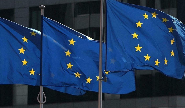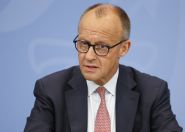- Home
- Middle East
- EU Proposes Ban of Russian LNG Fuel in Latest Sanctions Package
The European Union proposed Friday to bring forward by a year a ban on Russian gas imports as part of new sanctions to sap Moscow's war chest and please US President Donald Trump.
The 19th package of EU sanctions targeting Moscow since the 2022 invasion of Ukraine also seeks to hit firms as well as banks and traders in China, India, and other third countries accused of helping Russia circumvent sanctions.
Under the proposal, which needs approval by the bloc's 27 member states, the European Commission aims to phase out liquefied natural gas (LNG) purchases from Russia by January 2027.
"Russia's war economy is sustained by revenues from fossil fuels. We want to cut these revenues," commission chief Ursula von der Leyen said.
"It is time to turn off the tap."
The new sanctions package comes as the United States pressures the EU to end fossil fuel imports from Russia – and the bloc seeks in turn to coax Trump to take a tougher stance on Moscow over the Ukraine war.
The US leader has so far held back from upping pressure on Russian President Vladimir Putin but said last week he was ready to do so if allies stopped buying Russian oil and hit China with tariffs.
Russian Oil Imports Slashed
The EU has already banned most Russian oil under previous rounds of sanctions – slashing the share it imports from 29 percent in early 2021 to two percent by mid-2025.
Only Hungary and Slovakia, friendly to Moscow and Trump, still buy Russian oil.
EU foreign policy chief Kaja Kallas said Brussels was bringing forward by 12 months a previous pledge to end all imports of LNG from the end of 2027 to the end of 2026.
"Moscow thinks it can keep its war going. We are making sure it pays the price for it," she wrote on X.
Despite a push to end decades of European dependency, Russia still supplied 19 percent of the EU's gas in 2024 – down from 45 percent before the war.
This is in part down to an increase in purchases of LNG transported by sea, which have partially offset a sharp fall in pipeline imports.
In 2024, 32 billion cubic meters of gas entered Europe via the TurkStream pipeline, and 20 billion cubic meters through liquefied natural gas (LNG) shipments.
Crypto and China
The EU has managed to push through 18 rounds of sanctions over Moscow's invasion of Ukraine despite opposition from some member states, notably Hungary and Slovakia.
Von der Leyen said that with the latest batch, the EU was "going after those who fuel Russia's war by purchasing oil in breach of the sanctions."
"We target refineries, oil traders, and petrochemical companies in third countries, including China," she said.
Brussels also intends to target crypto platforms and the credit card system MIR, set up by Russia to avoid reliance on US-based networks, she and Kallas said.
The package also seeks to blacklist 118 more vessels in the "shadow fleet" of aging tankers used by Russia to circumvent oil export curbs and 45 firms accused of supporting the Russian military-industrial complex.
Entities from Russia, China, and India would face export bans and tighter controls, Kallas said.
While they will likely be seen as an attempt to meet Trump midway, the measures fall far short of his request that allies place up to 100 percent tariffs on Beijing and New Delhi.
That was expected, as Brussels, which is generally averse to tariffs, is currently negotiating a free trade pact with India and has no appetite for a broader trade war with China.
Some diplomats have critically noted that Trump's demands for European action coincide with US commercial interests, while allowing room for the president to again stall on taking a tough stance against Russia himself.
The United States – the world's top oil producer – is the largest supplier of LNG to Europe, accounting for almost 45 percent of total imports.
Most LNG is imported through terminals in France, Spain, Italy, the Netherlands, and Belgium – although it is hard to know how much is also consumed there or simply passes through towards other nations.
Umberto Bacchi / AFP
Read more


Comments